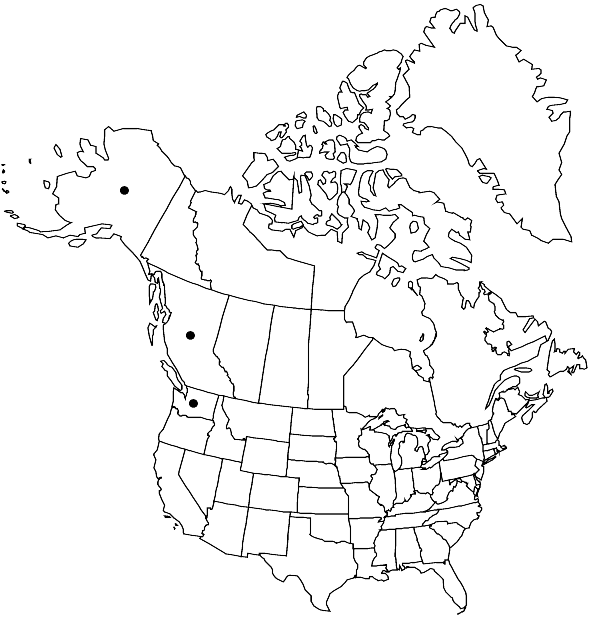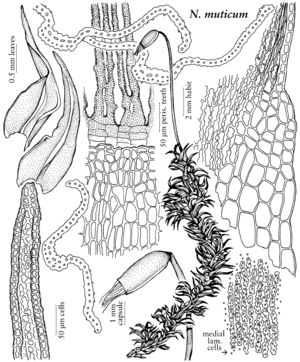Niphotrichum muticum
Cens. Cat. Polish Mosses, 138. 2003.
Plants medium-sized, rarely small or fairly large, mostly slender, in fairly loose or dense mats or tufts, light olivaceous, often with a rufous hue in the upper part, brownish to blackish brown proximally. Stems (1–)2–5(–9) cm, creeping, ascending to suberect, pinnately or sometimes irregularly branched to almost unbranched. Leaves imbricate and usually twisted and crispate when dry, erect-spreading to recurved when moist, narrowly ovate-lanceolate to triangular, sharply carinate and often distinctly plicate, 1.8–2.5 × 0.4–0.7 mm; margins narrowly recurved from the base to 3/4 way up the leaf, plane near the apex; muticous or sometimes with a short, to 200 µm, yellowish hyaline, weakly denticulate and sparsely papillose awn; costa yellowish, subpercurrent to percurrent, papillose and distinctly convex on the abaxial side, situated at the bottom of a fairly deep furrow, 40–60 µm wide at the base; basal laminal cells elongate 20–50 × 3–5 µm, with strongly incrassate, nodulose longitudinal walls, except for 3–5 epapillose cell rows at the insertion forming a bright yellow strip; alar cells yellowish hyaline, thin-walled cells in 4–6 rows, forming distinct convex auricles; supra-alar cells quadrate to short-rectangular, firm-walled forming ± pellucid, often indistinct or absent, marginal border of 10–15 not sinuose cells; medial and distal laminal cells subquadrate to short-rectangular, (7–)10–20 × 4–6 µm, with low and narrow, sometimes indistinct papillae. Inner perichaetial leaves membranous, crenulate-dentate at the apex. Seta brown, 6–10 mm. Capsule brown, cylindric, 1.2–1.5 mm, sulcate when dry; peristome teeth lanceolate, 650–850 µm, brown, densely low-papillose, 2-fid to the base. Spores 9–11 µm.
Habitat: Rocks, boulders, rocky ground, pockets of soil and humus over rock faces in dry or intermittently moist subalpine and alpine tundra-like heaths and barrens, cliffs and ledges, sometimes wet margins of melt pools
Elevation: moderate to high elevations (900-2000 m)
Distribution

B.C., Alaska, Wash., temperate Asia.
Discussion
Niphotrichum muticum is a circum-North-Pacific species having a discontinuous range extending from Honshu in Japan across the Aleutian arc and southern Alaska southwards to the Cascade Mountains of Washington, where it was once found with fully mature sporophytes. Otherwise, it is consistently sterile. The species is stenotypic. It is readily recognized by its leaf margins that are narrowly recurved to mid leaf or three quarters of the leaf length and by its leaves consistently muticous or with only a short, yellowish, hyaline, almost entire and faintly papillose awn, reaching only to 200 µm. Additionally, the costa is strongly convex abaxially and is distinctly papillose on the abaxial side. These features will easily separate N. muticum from epilose ecads of N. ericoides.
Selected References
None.
